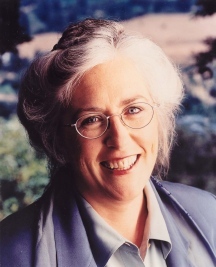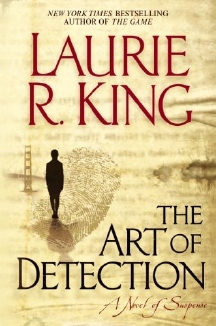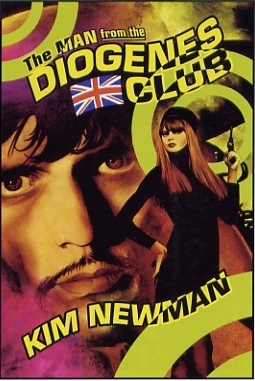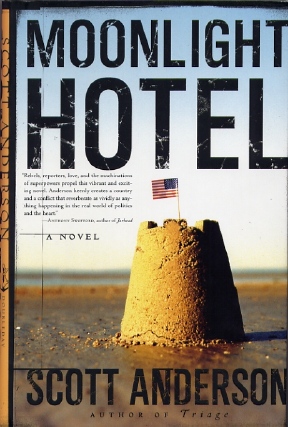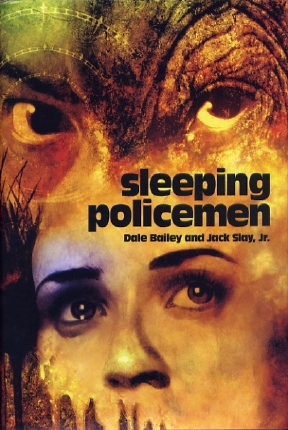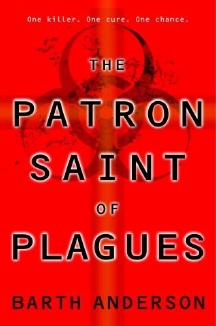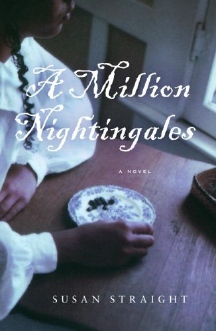|
|
|
This Just In...News from the Agony Column
|
05-19-06: Laurie R. King Detects the Artist of the Year |
||||||
Live
Wires In Santa Cruz
The Live Wire Writer's Improv will be the first part of a free two-part Profile Performance on May 20 in the Live Oak Community Room at the Simpkins Family Swim Center. If you can't be there in person, you can watch live video King as she writes on-line, from 11:00 AM until 1:00 PM PDT. It's a unique chance to witness the creation of a short story by one of the most versatile and gifted writers that our county and our country have to offer. Though she's known as a novelist, King writes more short stories than readers might expect. "It always seems to me I'm turning down requests for stories. I find short stories a disproportionate amount of work--twenty pages of short story should take five percent of the effort of a 400 page novel, but it feels more like seventy-five percent." Any writing -- live or otherwise, involves preparation, and King is on top of the game. "I've been tossing ideas around, mostly reminding myself of the parameters of the story I need--it's aimed to go into a collection for Dana Stabenow, combining crime and fantasy, yet also eventually intended to go into a collection of stories set in and around a middle school, which I've been slowly, slowly compiling over the past few years. The actual story won't come together in my head until I get the prompts from the woman at Parks and Rec who is gathering them by snail mail and online. I only hope she chooses some good ones!" Those who wish to participate in King's Live Wire writing experiment can submit prompts for her performance via the Santa Cruz County Parks & Recreation Department website, http://www.scparks.com. Part Two of the free Profile Performance will take place from 4:00-6:00 PM, as King is joined by fellow honorees Morton Marcus and James Houston in a panel discussion on "The Mystery of Writing," which I'll be moderating.
But wait -- there's more live King in the offing. Today -- and here I'm talking about Friday, May 19, 2006 -- at 10:00 AM PDT, I'll be interviewing King live on NPR affiliate KUSP. If you miss the live broadcast, you can always pick up the podcast on Monday. I've done bits and pieces of live radio now and again, and often I get myself in trouble, as I tend to, er, stretch the limits of what's allowed with regards to language. I don’t think that will be a problem today. And King is a great interview; I have to admit that the reason I'm willing to go live is that she practically interviews herself. Of course, we won’t know what’s going to happen until it happens. It's a live wire act, from interview to short story to panel discussion. After which, all of us in the panel shall be returning to our garrets, with nary a chance to revise. |
|
05-18-06: Kim Newman's 'The Man from the Diogenes Club' |
|||
Richard
Jesperson Swings Into Action
But of course, Newman himself did not invent The Diogenes Club. It was featured in several of Sir Arthur Conan Doyle's Sherlock Holmes stories, most notably "The Adventure of the Greek Interpreter": "...There are many men in London, you know, who, some from shyness, some from misanthropy, have no wish for the company of their fellows. Yet they are not averse to comfortable chairs and the latest periodicals. It is for the convenience of these that the Diogenes Club was started, and it now contains the most unsociable and unclubable men in town. No member is permitted to take the least notice of any other one. Save in the Stranger's Room, no talking is, under any circumstances, allowed, and three offences, if brought to the notice of the committee, render the talker liable to expulsion. My brother was one of the founders, and I have myself found it a very soothing atmosphere." Because Mycroft is eventually revealed to play a key role in the British government, the Diogenes Club has been often used by later writers as a sort of stand-in for the British Secret Service. Which brings us to Newman's Richard Jesperson, and Monkeybrain Books latest publication. From the to-die-for cover by John Picacio to the final word of the Afterword, in which Newman explains how he originally created Jesperson when he was eleven years old, 'The Man from the Diogenes Club' is exactly the sort of enchanting entertainment that you’d hope for from Newman. It's funny, wild and often rather scary. For a mere sixteen bucks, you get almost every Jesperson story, plus the original-to-this-collection "The Man Who Got Off the Ghost Train". When I interviewed Newman at the World Horror Convention, he explained to me that between the first story, "The End of the Pier Show," and this one, readers were pretty much getting a new novel. Readers who are wondering where the rest of the WHC coverage went are requested to exercise patience, as I'm currently cranking out interviews you'll see podcast in the weeks to come, including the aforementioned over-an-hour-conversation with Newman. To my mind, it's pretty certain that we'll be seeing more of Jesperson. He seems the sort of man that Kim Newman was not only born to create, but born to chronicle. And if 'The Man From the Diogenes Club' swings from the sixties and seventies, you can be certain that the eighties and beyond are beckoning. We all know that Newman marches to the beat of a different drum machine. It remains to be seen whether it is a Roland TR808 or Linn 9000. |
|
05-17-06: Scott Anderson Books a Room at the 'Moonlight Hotel' |
|||
The
Imaginary Nations
Like 'Absurdistan', 'Moonlight Hotel' is set in a fictional Middle Eastern kingdom, this one called Kutar. The time frame is the early 1980's, and a simmering, ancient tribal conflict unfortunately attracts the attention of an America ready to help. Oh us helpful Americans! David Richards is a junior diplomat in the American Embassy in Kutar, who spends his time cutting deals for development, schmoozing at cocktail parties and chasing a series of visiting American women and other diplomats' wives. It's a good life that even a local war cannot quite bring to a halt. As the tribal conflict grown more intractable, the American response, lead by one Colonel Munn, grows more insane. But it's a familiar, comfortable American insanity. The kind that results in a mass evacuation of Americans, except for those few left behind to sort things out. Richards is among the chosen few ordered to stay behind and evacuated to the Moonlight Hotel in Laradan, the capital of Kutar. When the going gets tough, the tough make reservations. Anderson is a war correspondent who has booked rooms in popular vacation hotspots around the world. Apparently, he finds relaxing climes like Beirut, Northern Ireland, Chechnya, Israel, Sudan, Sarajevo and El Salvador the perfect place to toss back a cool martini and noodle about while the bombs fall. While most of us might not find this sort of thing restful, Anderson thrives -- because he's one of those people who get to attend war zones without the comfort of holding a gun. Perhaps this whole war correspondent occupation is not the cush gig one might be lead to believe. But if someone is going to do it, we're lucky to have Anderson there. His previous novel was 'Triage', and with his brother Jon Lee Anderson, he wrote 'The Man Who Tried to Save the World'. Well, we can guess how that went. At least they consider it worth saving. There are some as would want to argue about it. In 'Moonlight Hotel', Anderson brings a very nicely understated sense of the oblivious to his portrait of American foreign policy at work. When Richards shows up at the Moonlight Hotel, the locals are not exactly thrilled. "Arkadi hoped that his surprise didn't register on his face; he had been expecting someone older and more distinguished looking–certainly someone better dressed." Anderson's sense of humor is infused with his own deep personal experience of Americans abroad. Even when we find ourselves in the thick of it, some things remain important. Women. Booze. Deals. 'Moonlight Hotel' itself becomes a Kutar-in-miniature, a small stage for the events playing in the countryside that surrounds it. For this reader, one of the most interesting aspects is Anderson's use of the fantastic. Sure, 'Moonlight Hotel' is being marketed as a mainstream novel, and it is one, to a certain extent. But the country and customs of Kutar are the product of Anderson's experience filtered through his writerly imagination. The veneer of the unreal is paper-thin, but no less unreal. Kutar is the product of Anderson's creative insights just as Middle Earth was the product of Tolkien's insights. Both based their creation on personal knowledge of language, customs and behaviors of real people. Anderson may leave out the orcs, but who needs orcs when you've got Colonel Munn and an American foreign policy based on American fantasies of what we'd like the world to sing? We may call it perfect harmony. But to other ears, it may sound a whole more like people screaming for us to leave them alone. 'Moonlight Hotel' has the sort of miasmic hothouse atmosphere of a fever dream, of an illness endured abroad. You get goofy, you get sentimental, you get fiercely angry, and you stumble into horrifically dangerous situations without a care in the world. Because wherever you are, you're an American. In America. We're all the boys in the bubble. The rest of the world is merely a fantasy, waiting to become America. |
|
05-16-06: Dale Bailey and Jack Slay Jr. Are Wary of 'Sleeping Policemen' |
|||
Make
A Bad Thing Worse The Easy Way!
Nick Laymon of Bailey and Slay's might be a nice guy at the onset of 'Sleeping Policeman', but that doesn't last long. Laymon's about to have the first of several very bad nights, even when he thinks he's just going out for beer with his buddies to be followed by quality time with the gal of his dreams. But you know, Layon's one of the many who think, "Don’t drink and drive, don't drink and drive -- how am I going to get anywhere?" You run down that guy on the road, you'll get somewhere all right. Alas in this case, "somewhere" proves to be a bus station locker with a video tape inside of it. What's on the tape will prove to be quite hazardous to Nick's health, and it's no namby-pamby girl with problem bangs. There will be bangs, but not the kind you clip. Rather, the kind that clip you. Bailey and Slay Jr. write in a seamlessly integrated voice and provide the reader with the sort of stay-up-all-night tension that the characters themselves are feeling. It's stripped down, but richly evoked. What shines here is the milieu of the characters, the feeling of an everyday world slipping quickly off the tracks. Bailey and Sly Jr. offer enough detail to keep the fishhooks in and yanking, yanking hard, but not so much as to overwhelm the forward impetus provided the classic plot. That classic plot, where one bad decision leads to another commands a great deal of power in our society. It touches on a universal fear, the understanding that most of us are but one poor choice away from a world of hurt and misery. What's more, we all know that once we head down that slippery slope, there's no turning back. Life can extend those 10 seconds before the car crash into an infinity of tension-packed terror. Once you know you’re going to crash, there's no acceptance, no easing of tension. No, there's just a slowly increasing anticipation of not just the crash, but the consequences. Oh, the consequences are always worse. And to my mind, one of the most interesting aspects of this novel is the skill with which the writers keep us interested and gripped by the particulars, the precise details of the lives we don’t and will hopefully never know. While we have seen this sort of plot many times, there's a reason. Good writers can get a grip on the reader and never have to let go. It helps that Golden Gryphon have invested wisely. The cover art is by John Picacio, whom I talked to at length during the World Horror Convention. (We'll hear more about this once I get past this week. It's been busy and will continue to be so!) This is a nice, short suspense novel, the kind you might think "they don’t make anymore." But 'Sleeping Policemen' is coming to say it ain't so. You might worry that 'Sleeping Policemen' will take you places you don’t want to go. That is surely so, but unlike the characters, you'll come out unscarred. Or not. |
|
05-15-06: Barth Anderson is 'The Patron Saint of Plagues' ; A 2006 Conversation with Susan Straight and Jenn Ramage |
|||
Ascension and Domenica
There are all kinds of truth, and Barth plays with alternate history to help set up a disturbing speculative future. In Barth's vision, Mexico of the near-future is controlled by a Catholic theocracy, turning the in-reality contentious border into a flashpoint for all-out war. Protagonist Henry Stark is smuggled in to determine the source of a viral outbreak that threatens the tattered remains of peace. Working for the CDC, Stark arrives at an answer to a question he'd prefer never to have asked. 'The Patron Saint of Plagues' is just the kind of novel that will grab you by the collar, sit you down and let you up just in time to go to work the next day, so long as you are a sucker for disease-terror fiction, and who is not in these post 'The Hot Zone' days? The plot is tense, plausible and twisty enough to keep you breathless and guessing. And if this was all the novel was, hell, it would be a fine accomplishment. But Anderson does a lot more than entertain with sloughing skin and bleeding from the orifices. Sure, disease is scary, but his tweaked version of reality has so many kernels of reality within that it provides far more frights and thrills than flatlining patients and vector spread factors. Anderson's vision of the US brought down by its own heavy-handed policies is hardly science fiction, which is why, when it is cast in a slightly science-fictional light, it seems ever more terrifying. You can show me all the scary lies and exaggerations you want, and while they may thrill me they won’t chill me. But tell me the truth wrapped in a fiction that makes reality perfectly clear and my skin will crawl right off in a manner that will make faux-dengue fever seem like a light sunburn. Anderson also, almost casually, inaugurates a sort of science fiction I think we'll be seeing a lot more of in the non-science fictional near future. We're all too familiar with the future of America and Britain. But the rest of the world tends to get the short shrift in science fiction, or has at least, until now. Anderson's work is a subtly subversive swipe at world shiny, worlds gritty but mainly at worlds American. He lives wherefore he writes and it helps him infuse the novel with a unique feel that adds a layer of unreality to the proceedings. But this layer of unreality is underpinned by an actual reality -- life in Mexico in the 21st century. The result is a science fiction novel that feels both extra real and extra unreal. He also gets to have a lot of fun with his techno-imagination, spinning the usual near-future scenarios with a local flavor informed by his local experience. Instead of leading edge technology, you get trailing edge technology, which thought it may be broken from use, is usually more reliable. It offers him the opportunity to mix up the usual techno-innovation and breakdown relationship in ways that make the thriller elements more thrilling and the science fiction elements more unusual. Bantam Spectra has done themselves a favor with this oddball thriller, giving it a fire-engine red cover that is sure to attract and repel the eye in equal measure. But you know, this is a trade paperback original. The print is big, the book lies flat and if any book was designed to accept the salsa from your chili verde, it was this one. Quite soon you won't care what is on the outside. But you will care about the inside, even if it makes your own insides feel rather unsettled. It's not the lunch! It's the hunch that Anderson may have unfurled for you the first map of a New World where obliviousness leads intractably to oblivion. |
|||
'A Million Nightingales'
I was lucky enough to have KUSP Talk of the Bay host Jenn Ramage interview Straight when she came to Capitola Book Café recently. Once again, we vary the voices here in The Agony Column and bring to you an interview first broadcast on KUSP. Readers can download the article in MP3 and RealAudio formats. I'm smart enough to let Jenn and Ms. Straight do the talking -- and you, the readers, are smart enough to do the listening. I've left the best for last -- the actual buying of the book. If you're lucky, you might still be able to catch Straight on tour. And even if she's already passed through town, if you check your local independent bookseller, chances are you might be able to find a signed copy. Consider this article the blip on your reading radar. Incoming! Time to buy. |
